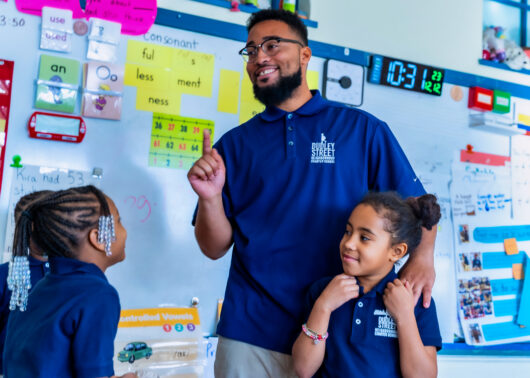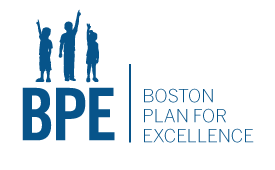View this information in multiple languages:
Cape Verdean Creole (Kriolu)
Portuguese
Spanish
Vietnamese
Haitian Creole
Many of our Dudley Street Neighborhood Charter School scholars come from multilingual households. Some of these scholars are classified as English Learners (EL – formerly ELL or LEP). Our EL program strives to empower ELs as global citizens and real-world problem solvers while celebrating their multilingual and multicultural identities while preparing them for success in middle and high school, college, and beyond.
Identification
State and federal laws require that school districts assess the English proficiency of all newly enrolled students whose home language is a language other than English. The purpose of this assessment is to identify students’ English language proficiency and to determine if they require direct instruction and support to complete ordinary class work in English. Based on the results of a linguistic evaluation, if students are identified as EL, they qualify for language support services.
Enrollment in Boston Public Schools (BPS), including DSNCS, requires registration through Welcome Services, where families must complete a Home Language Survey. If the answers to the survey indicate that a language other than English is spoken at home, the student must be evaluated for language proficiency. For students entering DSNCS in K1, this is completed at the school level during the annual testing window (typically in March). For students in K2 and beyond, this evaluation is completed by the Boston Public Schools’ Newcomer Assessment and Counseling Center.
Many students arrive at DSNCS from other BPS schools and have already been evaluated for EL status. If a student arrives at DSNCS from another school in the United States, ESL teachers will review the cumulative file from the sending school and analyze prior language testing results.
Keep in mind that limited English proficiency may not be readily apparent – students may appear to be proficient in one language domain (for example speaking or reading) while having difficulty in another domain (for example listening or writing). English Learners may also make effective progress in some classes, but not in others. Therefore, it is important for us to assess the language skills of any student who may be struggling as a result of limited English proficiency.
Placement
Test results and placement recommendations are shared with the student’s family, in their home language, no later than 30 days after the screening has been administered. DSNCS sends a Parent Notification Letter, written in the family’s home language.
A parent may decline to enroll their child in the recommended English language program by signing an opt-out letter. If a parent opts out, the student will not receive ESL services, and a copy of the letter will be maintained in the student’s ELD folder. These students are still considered EL students until they meet the exit criteria. DSNCS will administer ACCESS annually to determine their English language proficiency, per district and state policy.
Annual Assessments
DSNCS tests the English proficiency of all EL students annually. Students take the WIDA ACCESS Test (ACCESS) in January of each year, which measures their proficiency in reading, writing, listening, and speaking English. ACCESS is administered by staff who have completed WIDA’s ACCESS Administration training. DSNCS considers the results to drive programming for the following academic year and shares the results with families.
For students entering Boston Public Schools and DSNCS in K1, testing is completed annually in March using the Kindergarten WIDA ACCESS Proficiency Test (K W-APT), which measures their proficiency in listening and speaking English.
EL students also participate in the same standardized and curriculum-based assessments as their non-EL peers.
Former English Learners (FELs)
Annual assessments are also used to determine when an EL student meets the criteria for exit from EL programming. Those students become classified as a Former English Learner (FEL). Once a student has been re-designated as FEL, DSNCS will monitor them for four years to assess their academic progress without language support. If a FEL fails to make academic progress, as measured by their grades and content area assessments, and the school-based team determines that this failure is due to a lack of English language proficiency, then the student must be re-classified as an EL. The student will be assigned to receive ESL services.
Program Model
DSNCS operates a Sheltered English Immersion (SEI) program. Students designated as EL are placed in a cohort that includes both EL and non-EL students. Classes in those cohorts are taught by SEI-endorsed teachers with licenses in the appropriate content area (or teachers on DESE waivers). Depending on students’ levels, they will receive pull-out services, push-in services, or a combination of the two.
English Learners with Disabilities
Many students with disabilities, including English learners, are allowed accommodations on state and district wide testing, including MCAS. Their allowable accommodations are listed in their Individualized Education Plan (IEP) or 504 Accommodation Plan (504 Plan).
 Dudley Street Neighborhood Charter School is now a Tier 1 school as measured by the Boston Public Schools School Quality Framework (SQF) in 2023-2024. This framework assesses schools in five areas: Student Performance, Teaching and Learning, Family, Community and Culture, Leadership and Collaboration, and Student Access and Opportunities. Each school receives a score from 0 to 100. Tier 1 schools received the highest scores (65-100).
Dudley Street Neighborhood Charter School is now a Tier 1 school as measured by the Boston Public Schools School Quality Framework (SQF) in 2023-2024. This framework assesses schools in five areas: Student Performance, Teaching and Learning, Family, Community and Culture, Leadership and Collaboration, and Student Access and Opportunities. Each school receives a score from 0 to 100. Tier 1 schools received the highest scores (65-100).



